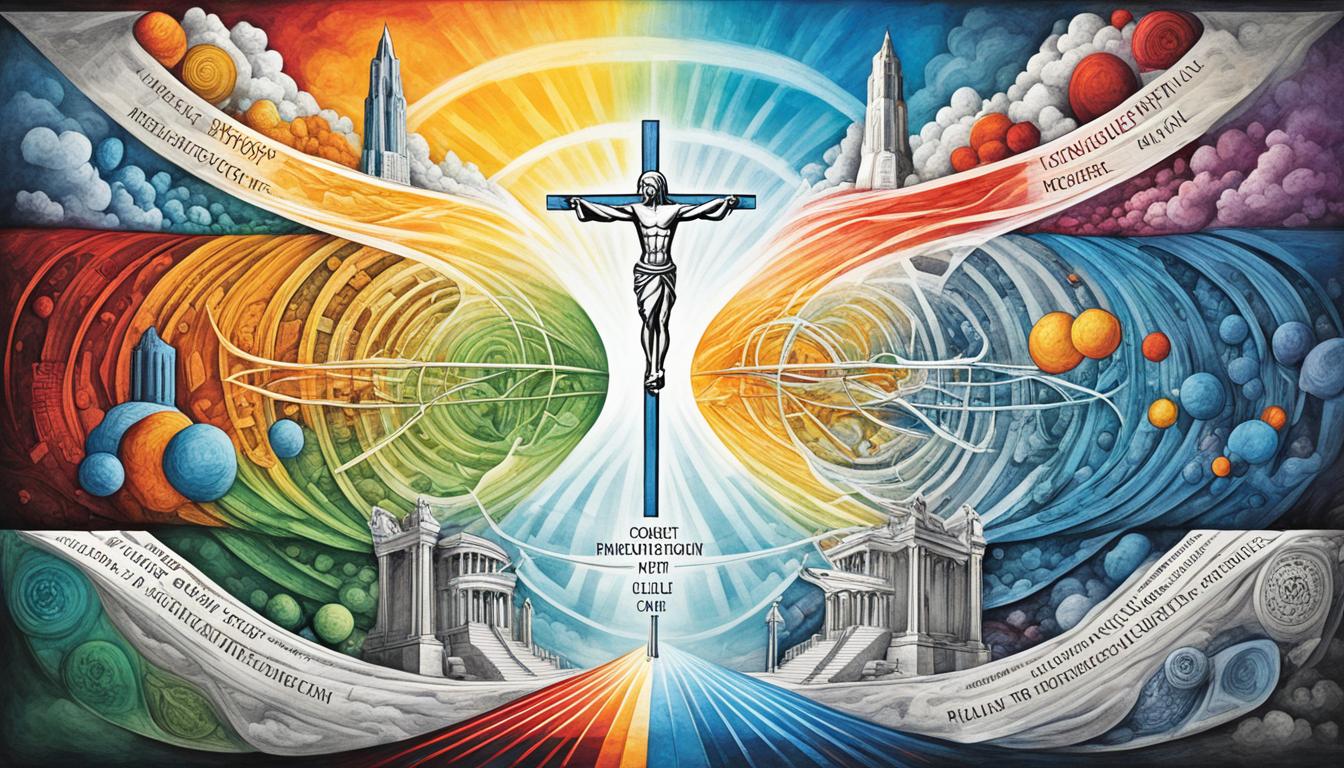Finding balance between religion and relationship is essential for individuals who are navigating their spiritual journey. While religion and relationship can sometimes be seen as opposing forces, they can also enhance each other when approached with mindfulness and understanding. This article will delve into the nuances of religion vs relationship, providing insights and strategies for creating a harmonious balance in your personal spiritual growth.
Key Takeaways:
- Understanding the difference between religious beliefs and personal spirituality.
- Nurturing a personal connection with God through spiritual disciplines.
- Exploring the similarities and differences between religion and relationship.
- Addressing challenges in navigating religious differences in relationships.
- Fostering harmony by respecting each other’s beliefs and supporting spiritual growth.
The Definition and Purpose of Religion
Religion is a fundamental aspect of human society, encompassing a rich tapestry of organized beliefs, practices, and systems. It provides individuals with a framework for understanding the world, their place in it, and their relationship with a higher power or supernatural being. At its core, religion offers a worldview that offers answers to life’s deepest questions and provides guidance for moral decision-making.
Central to religion are its organized beliefs, which shape the way followers perceive and interpret the world around them. These beliefs vary across different religious traditions, encompassing ideas about the nature and purpose of existence, the afterlife, and the existence of a divine being or beings. Through adhering to these beliefs, individuals can find meaning and purpose in their lives.
Practices and rituals are integral to religious traditions as they serve as vehicles for expressing devotion and connection to the divine. Whether it is prayer, meditation, communal worship, or the observance of significant ceremonies and milestones, these practices provide a tangible way for individuals to engage with their faith and foster a deep spiritual connection.
Religion also provides a moral compass, offering guidance on how individuals should lead their lives and interact with others. Moral teachings within religious traditions often emphasize values such as compassion, justice, love, and forgiveness, providing believers with a moral foundation to navigate the complexities of human existence.
Religion offers a sense of community and belonging, fostering social cohesion and shared experiences among its followers. It facilitates the formation of supportive networks that provide comfort, encouragement, and a sense of identity. These communities serve as spaces for individuals to forge meaningful relationships, cultivate friendships, and find solace and understanding.
Overall, religion serves to provide individuals with a comprehensive worldview, a moral framework, and a sense of community. It offers a space for personal growth, self-reflection, and the exploration of existential questions. By engaging in religious beliefs, practices, and rituals, individuals can find solace, meaning, guidance, and a deeper understanding of themselves, their place in the world, and their connection to the divine.

Nurturing a Personal Connection with God
While religion focuses on organized beliefs and practices, nurturing a personal connection with God goes beyond adherence to rituals. It is about fostering a deep and intimate relationship that is built on faith in Jesus and sustained by spiritual disciplines.
Building a personal connection with God starts with faith in Jesus as the central figure of your belief system. It is through this faith that you can begin to cultivate a profound relationship with Him, deepening your understanding of His teachings and the purpose He has for your life.
To nurture this personal connection, engaging in spiritual disciplines such as prayer, meditation, and studying religious texts is vital. These practices open the channels of communication and allow you to listen to and understand God’s guidance. Through prayer, you can express your thoughts, desires, and concerns to God, while meditation helps create space for His voice to be heard. Regularly studying religious texts, like the Bible, provides insights into His teachings, enabling you to align your life with His will.

Responding to God’s communication is an essential aspect of nurturing this personal connection. It involves actively listening, discerning His voice, and aligning your actions with His teachings. By living a life that reflects His values and principles, you demonstrate your commitment to the relationship, allowing it to flourish and develop.
Remember, building a personal connection with God is a journey that requires dedication and openness to receive guidance from the Holy Spirit. It is through this connection that you can experience a deeper sense of purpose, fulfillment, and spiritual growth.
Examining the Differences and Similarities
The debate between religion vs relationship encompasses a wide spectrum of perspectives. Religion is often seen as a set of rules and rituals, while relationship focuses on developing a personal connection with God.
However, these two concepts are not mutually exclusive. In fact, they can complement each other in profound ways.
Religion can provide a moral foundation and community support, while relationship deepens personal connection and faith.
Shared beliefs, values, and rituals are central to both religion and relationship. Religion offers a framework for understanding the world and a set of guidelines to live by. It provides a moral compass that helps individuals make ethical decisions and navigate societal norms.
Similarly, a relationship with God provides a moral foundation rooted in personal experience. It allows individuals to develop a deep sense of purpose and meaning in life, guiding their choices based on a personal connection.
Rules in religion often refer to specific codes of conduct that followers are expected to adhere to. These rules provide structure and offer a sense of stability and order within a religious community.
On the other hand, relationship emphasizes a more flexible and organic approach. It involves cultivating a personal connection through prayer, meditation, and an ongoing dialogue with God.
Rituals in religion serve as symbolic acts that connect individuals to the divine and remind them of their spiritual commitments. These rituals can include prayers, ceremonies, and sacraments.
Similarly, a relationship with God can involve personal rituals that deepen the connection and symbolize devotion. These may include reading religious texts, engaging in acts of service, or spending quiet time in contemplation and reflection.
Both religion and relationship contribute to the moral foundation of an individual. By integrating the values and principles derived from religion into their relationship with God, individuals can find a harmonious balance that enriches their spiritual journey.

Navigating Challenges and Fostering Understanding
Religious differences in relationships can be challenging, but with open communication, respect, and compromise, they can be navigated successfully. It is important to acknowledge and understand each other’s beliefs, traditions, and practices without imposing or belittling. Building a foundation of respect and seeking professional guidance if needed can help couples find common ground and support each other’s faith journeys.

“When faced with religious differences in your relationship, remember that open communication, mutual respect, and compromise are key to maintaining harmony.”
Creating Harmony in Relationships
When it comes to maintaining harmony in relationships, finding a balance between personal faith and mutual respect is crucial. It requires open and honest dialogue, a deep respect for each other’s beliefs, and a willingness to find compromises that uphold individual faith while fostering a sense of unity and respect.
In order to create this harmony, it is essential to engage in open dialogue with your partner. Take the time to actively listen to their perspectives, ask questions, and seek a deeper understanding of their faith journey. By nurturing an environment of open dialogue, you can build a foundation of mutual respect and appreciation for each other’s personal beliefs and experiences.
“Effective communication is the key to navigating religious differences in relationships,” says Dr. Emily Torres, a relationship therapist. She emphasizes the importance of creating a safe space to discuss and share your faith beliefs, concerns, and aspirations. This open dialogue allows both individuals to express their thoughts and emotions honestly without fear of judgment or rejection.
Sometimes, finding compromises may be necessary to strike a balance between personal faith and the needs of the relationship. This might involve making joint decisions about religious practices, rituals, or even attending religious services together. Remember, compromise doesn’t mean giving up your personal beliefs but rather finding ways to honor them while also respecting your partner’s beliefs.

Creating harmony in relationships requires a commitment to supporting each other’s spiritual growth. Encourage and celebrate each other’s milestones and spiritual experiences. This can include attending religious events, offering words of encouragement, or engaging in spiritual practices together.
“Mutual respect for each other’s faith journey is vital,” emphasizes Dr. Torres. She suggests acknowledging and appreciating the value that each person’s beliefs bring to the relationship. This respect helps to create an environment where personal faith can thrive alongside the shared bond of love and companionship.
“Maintaining harmony in a relationship goes beyond religion or belief systems; it requires a foundation of love, trust, and respect,” says Dr. Torres. By prioritizing open dialogue, mutual respect, compromise, and a commitment to supporting each other’s spiritual growth, couples can navigate the complexities of personal faith in a way that strengthens their relationship.
Embracing the Complexity of Religion and Relationship
Navigating the intricacies of religion vs relationship is an ongoing journey that requires mindfulness, understanding, and open-mindedness. Instead of seeing them as conflicting forces, it’s important to embrace the complexity of diverse beliefs and practices. By doing so, you can create supportive relationships that foster personal growth and spiritual connection.
Finding balance is key. Nurturing your relationship with God through spiritual disciplines such as prayer and meditation can deepen your personal connection. At the same time, respecting and understanding each other’s beliefs is vital for creating harmony in your relationships.
Remember, the journey itself is what brings fulfillment and enlightenment. By embracing the complexity, embracing diverse beliefs, and fostering supportive relationships, you can experience profound personal growth and a deeper sense of spirituality. So, take this opportunity to embark on this rewarding journey of self-discovery and connection.
FAQ
What is the difference between religion and relationship?
Religion refers to organized beliefs, practices, and systems centered around the worship of a higher power or supernatural being, while relationship with God is about nurturing a personal connection through faith in Jesus and spiritual disciplines.
Can religion and relationship coexist?
Yes, religion and relationship with God are not mutually exclusive. Religion can provide a moral foundation and community support, while relationship deepens personal connection and faith.
How can religious differences be navigated in relationships?
Open communication, respect, and compromise are key in navigating religious differences in relationships. It is important to acknowledge and understand each other’s beliefs, traditions, and practices without imposing or belittling.
How can personal faith and mutual respect be balanced in relationships?
Balancing personal faith and mutual respect requires open and honest dialogue, respecting each other’s beliefs, and finding compromises that uphold individual faith while fostering unity and respect.
How can individuals embrace the complexity of diverse beliefs and practices?
Embracing the complexity of diverse beliefs and practices involves mindfulness, understanding, and open-mindedness. It can lead to supportive relationships that foster personal growth and spiritual connection.
Source Links
- https://mytherapistnc.org/blog/how-having-different-levels-of-faith-can-affect-your-relationship
- https://www.faithfulfinishlines.com/religion-vs-relationship-with-god/
- https://www.allohealth.care/healthfeed/sex-education/does-religion-matter-in-a-relationship


